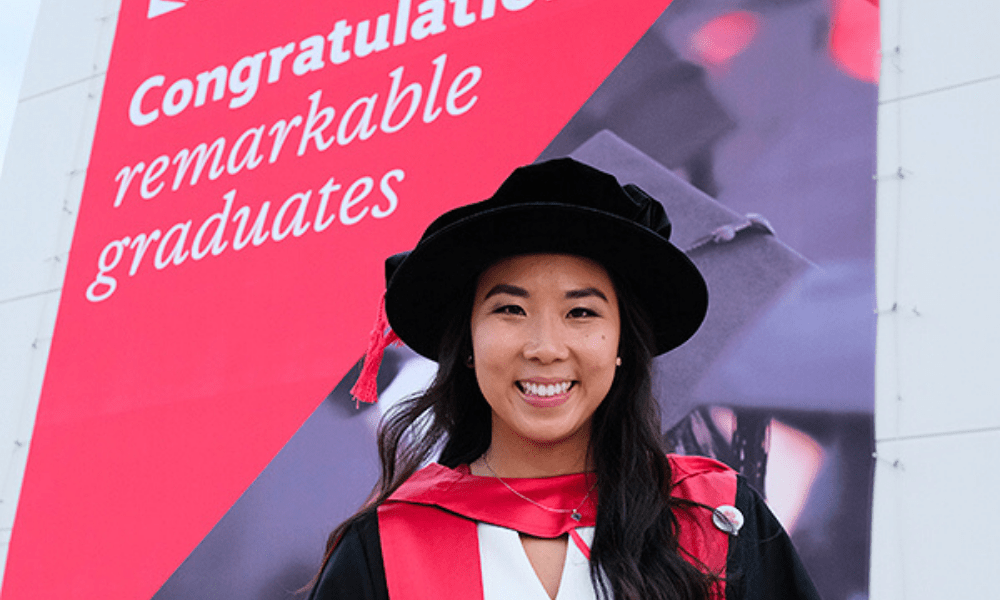Hayman Lui is in her first post-graduate year since finishing her Doctor of Medicine / PhD concurrent pathway at Griffith University. Here, she shares her experience as a medical intern at Ipswich Hospital.

It was only six months ago that we were walking across the stage, receiving our hard-earned medical degrees and celebrating a milestone in our lives and careers. We were nervous and excited, oblivious to the overwhelming change that was about to touch our healthcare system as the COVID-19 pandemic swept through Australia’s borders. With lockdown finally easing up on home soil, I’ve had some time to think about a few lessons that I have learned as a junior doctor on the wards during this crisis.
1. Learn to dance with uncertainty.
The greatest enemy is fear: fear of what’s to come, fear of what we don’t know. Like everyone else in the community and especially our patients, this lack of control was unsettling. Some of my colleagues were redeployed to the COVID ward, others to the frontline fever clinics, more to the intensive care unit and to the emergency department. We lived day by day waiting for our consultants to pass on directions from hospital briefings, uncertain of what would happen next. Weeks grew long as we experienced last minute roster changes or picked up extra shifts to cover for sick staff. No one was exempt, but we tackled it as a team.
During the peak of the pandemic, it was important to remember that growth always happens outside our comfort zone. While we know now that our hospital was well prepared to fight this virus, I was reminded yet again of the importance of learning to dance with uncertainty. Keeping an open perspective during these unexpected circumstances allowed me to do my job looking after patients on the medical or surgical wards while maintaining focus to learn the basic tenants of medicine. Already I can see that COVID-19 has helped me build resilience.
2. Remember you are human.
I have learnt that it doesn’t matter what GPA you finished medical school on, how many procedures you have completed or how many guidelines you have studied, we are still human and because of that unavoidable fact, we still make mistakes. I have been blessed with registrars, consultants, nurses and administrative staff who have protected a safe place to ask questions. This pandemic may have pushed us to learn quicker, but if we have the courage to speak up and ask for help or guidance, we never have to do it alone. Being human is a strength and not a weakness.
3. The best medicine is kindness.
As doctors, we are in a privileged position to be present during our patient’s most vulnerable moments. I believe that COVID-19 has amplified this and brought out the best and the worst in us. I have seen stereotypes within different members of our workforce be broken down. I have seen people cry from sadness and desperation, as well as from joy and gratefulness. I have experienced verbal abuse about gender and race in relation to my job from patients who are facing demons of their own. All these things are very real, but the way in which we respond is what defines our experience and character.
Learning about the rawness of human connection and the importance of compassion and empathy in our practice cannot be done in the lecture room. No matter what specialty we end up following, these traits are key to being a good doctor. “How am I showing up today? Am I being kind to myself? Am I being kind to others?”. This became my new daily mantra that will stick with me well beyond the days of COVID-19.
I initially chose medicine when I was 16 because I was passionate about making a difference in the lives of others. I continue choosing medicine because it is a profession that challenges me to be a better person. One day, I believe that we will look back on this pandemic and see how it has made a generation of better doctors.
Through her research, Dr Hayman Lui (PhD) has made significant contributions to the field of orthopaedic surgery. In 2017, she was awarded the prestigious Endeavour Research Fellowships which allowed her to further her research at the Mayo Clinic. Her PhD project has a filed patent application and was awarded a major Australian Government BioMedTech Horizons Investment Grant to support its translation to clinical trials.
If like Hayman you are considering a career in medicine, find out more about Griffith University’s Doctor of Medicine today.



